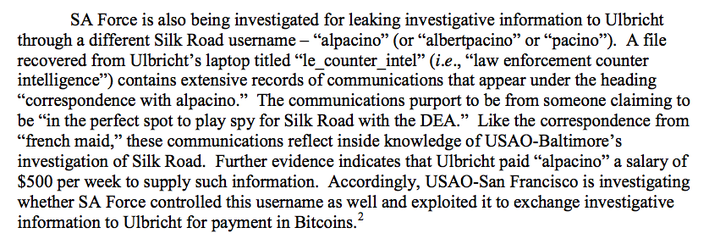BuzzFeed - Tech / 2016-11-29 17:34

Ross Ulbricht
A person with inside knowledge of law enforcement's investigation into dark-web drug bazaar Silk Road sold information to the site's mastermind, according to lawyers for Ross Ulbricht, the man convicted over the site and sentenced to life in prison.
Attorneys for Ulbricht, who was convicted last year of seven drug crimes, said Tuesday that a user named 'notwonderful' communicated with the Silk Road boss's Dread Pirate Roberts account on the site's forum in the summer of 2013.
According to the defense attorneys, notwonderful asked DPR to pay him or her an $8,000 down payment, with subsequent payments of $500 per month, in exchange for information on the authorities' investigation into Silk Road.
After DPR was said to have agreed, notwonderful allegedly set up an account on the Silk Road marketplace under the name albertpacino in order to receive the payments in bitcoins.
Ulbricht's attorneys believe that between $10,000 and $11,000 was paid by DPR to the albertpacino account. The last payment was made in September 2013 just weeks before Ulbricht's arrest inside a California library, where his laptop was still logged-in to the DPR account.
Ulbricht's lawyers said that the information "kept DPR one step ahead" of the investigation.
Ulbricht's lead attorney, Joshua Dratel, said that his team found the communications between notwonderful and DPR while examining an administrator version of the forum they just discovered this past summer during their persistent review of the massive amount of digital data — an estimated five to six terabytes — from the Silk Road.
However, in a puzzling twist, Dratel said that the communications were missing from previous versions of the forum that were turned over to the defense during the course of the case by the government. In fact, all forum data from July and August 2013 is missing from those government versions, Dratel said.
"Why was it wiped? Because somebody didn't want it to be found," Dratel said.

Silk Road
According to Ulbricht's attorneys, notwonderful told DPR that they were working as a law enforcement analyst and had access to the same intel as field agents. The notwonderful user allegedly told DPR that he was "in it for the money" and thought the Silk Road was "interesting" and "in a fantasy world I might be doing this myself."
Ulbricht's attorneys said that they reviewed the investigation information that notwonderful provided to DPR and that the timing and substance of communications align with information that agents testified to during the case, further leading them to believe that the person operating notwonderful was a corrupt law enforcement agent.
However, Dratel said that they had reason to believe notwonderful is not one of the two former law enforcement agents who were convicted of corruption related to their investigation into Silk Road, DEA agent Carl Mark Force and Treasury Department special agent Shaun Bridges.
Force and Bridge were caught extorting hundreds of thousands of dollar in bitcoin from site admins that they transferred to personal accounts.
Dratel said that during the investigations of Force and Bridges all of their electronic devices were seized and investigated by the government, and neither albertpacino or notwonderful came up. If one of the corrupt agents had operated under these aliases, Dratel said, "We would have seen it in hundreds of pages."
However, the albertpacino handle was referenced in the Force case at least one time during the investigation, according to a recently unsealed 2014 letter in which Department of Justice officials discussed their probe of agency corruption:

Department of Justice
However, the albertpacino handle was never officially mentioned again in the case.
"This is someone else," Dratel maintained.
Ulbricht's team said that they sent a letter requesting additional discovery to prosecutors handling the case against the corrupt agents in the District of Maryland. They hope to gain more information about notwonderful and albertpacino and determine why exactly the forum communications were wiped from versions of the site that the government turned over to the defense.
"If they have investigated, we should be apprised of the results," Dratel said. "If they haven't, the government is derelict."
Ulbricht is currently appealing his life sentence in the Second Circuit. At the appeal arguments in October, the judges indicated some apprehension, calling the life sentence for Ulbricht "unusual" and "quite a leap" given his lack of a criminal history.
The judges also asked whether allowing the impact statements of families whose loved ones died after buying drugs from the Silk Road and overdosing created "enormous emotional overload" at sentencing.
During his argument at the appeal, Dratel told the panel of judges that corrupt agents had administrative privileges and hijacked user accounts. "They were inside the guts of the website," Dratel said.
Ulbricht's attorneys said that this new evidence would not have direct immediate impact on the appeal. However, Dratel said that this new information "amplifies our defense that the investigation lacked integrity."
They also said they would not ask the Second Circuit to put the appeal aside while they continue to investigate. However, they said they were not ruling out using this new information about notwonderful selling information to DPR as the subject of a new trial motion at some point.
LINK: Judges Question Whether Life Sentence For Silk Road Founder Is Unfair






